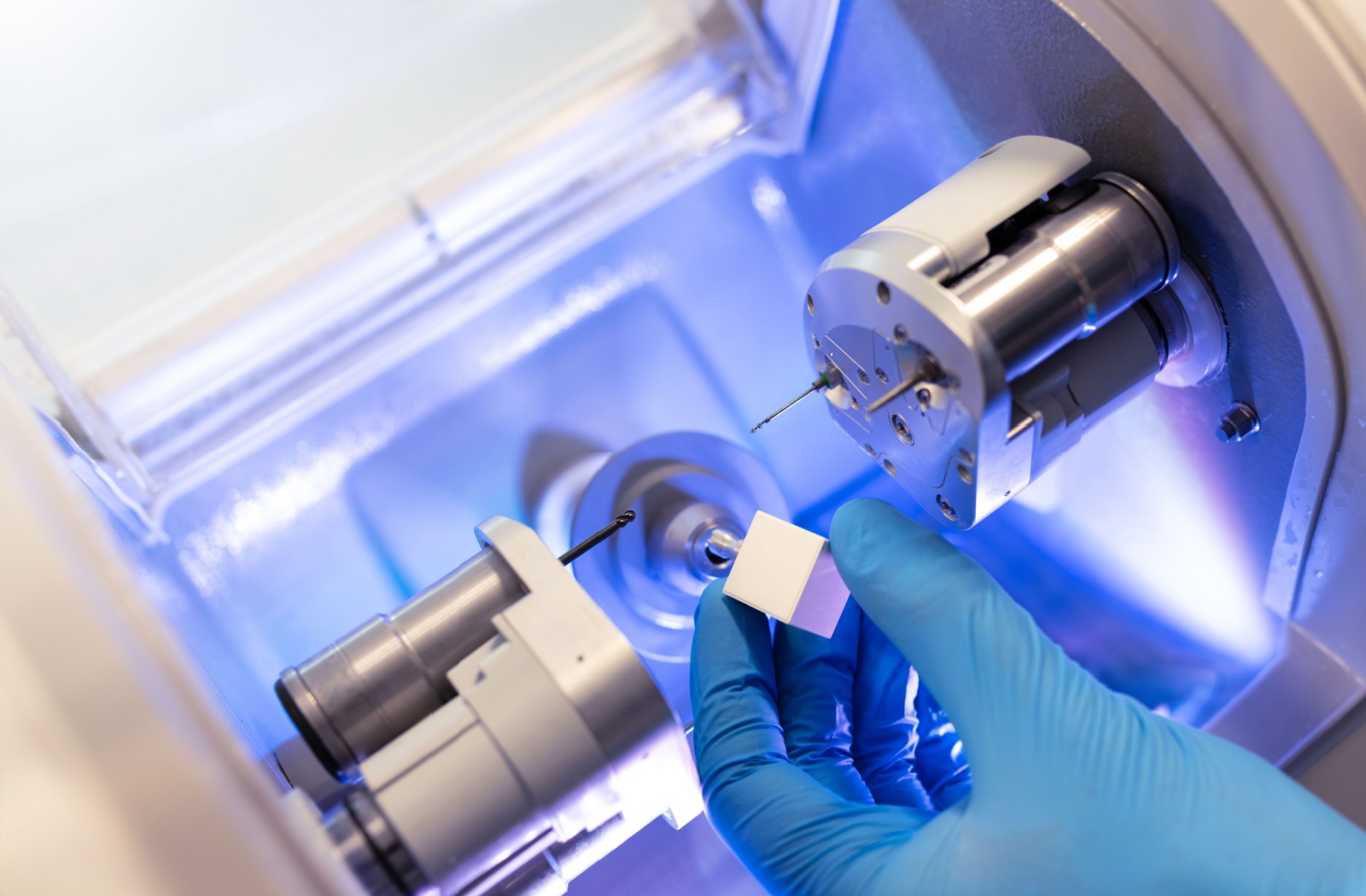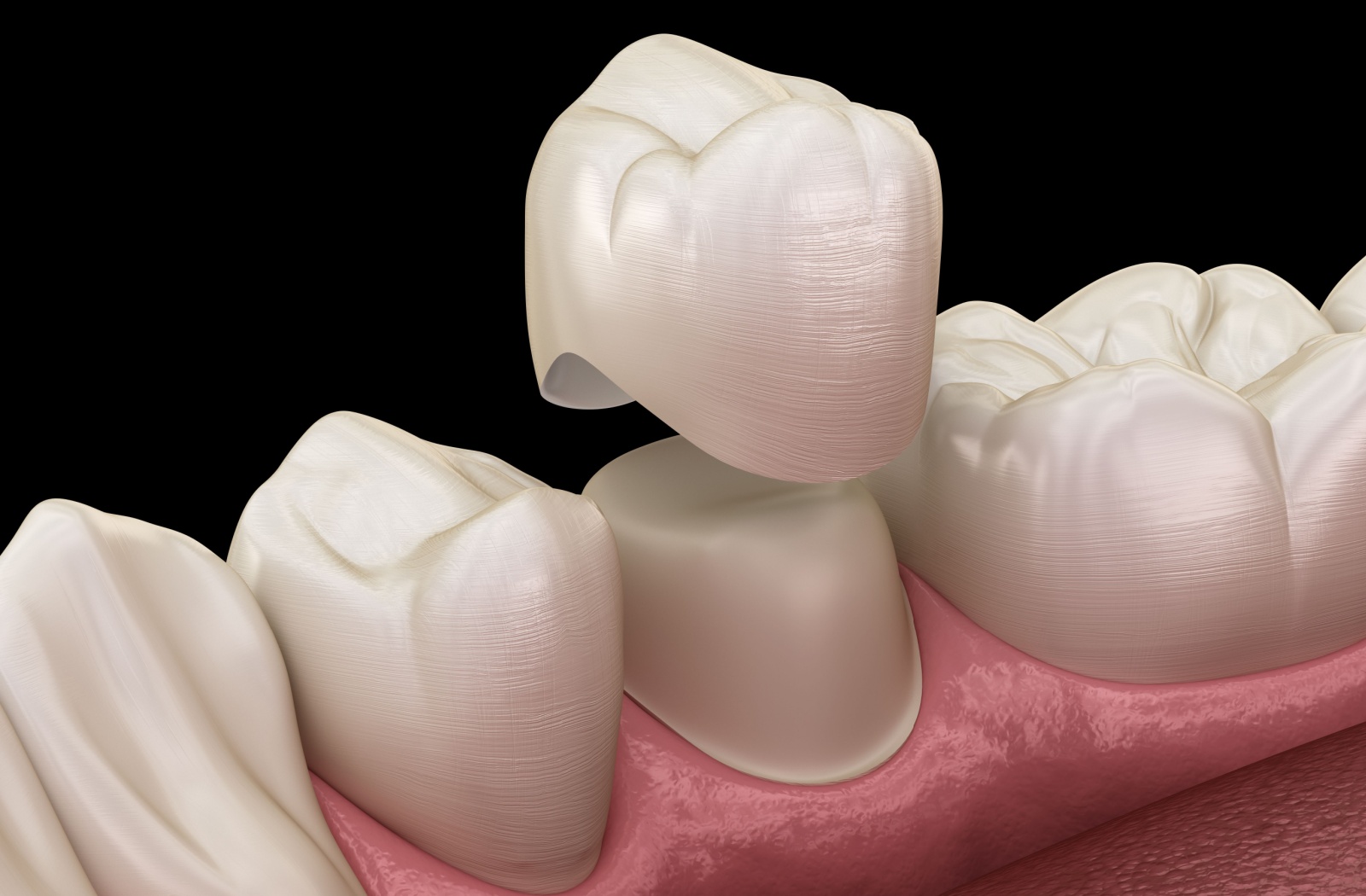If you have a tooth that’s damaged but doesn’t require removal, a dental crown can help. Also known as caps, dental crowns are placed over damaged teeth to restore the way they look and work.
The procedure for a dental crown involves filing down the treated tooth, creating an impression, and fitting the patient with a temporary crown. The final crown is traditionally placed during a follow-up appointment.
However, in modern clinics, we can use CAD/CAM technology to design, manufacture, and fit crowns in one day.
With proper care, a dental crown can last 10 years or more. Be sure to brush and floss your crowns just like you would for your natural teeth.

What Are Dental Crowns?
Dental crowns or caps are artificial teeth that a dentist fits over natural teeth that are damaged, malformed, or have turned an undesirable colour. Crowns can look a lot like natural teeth, and you can choose from materials like metal and porcelain, depending on your preferences.
Crowns aren’t just for improving the appearance of your smile. Because they function much like natural teeth, they can help with chewing and eating, and they also protect the tooth underneath from further damage.
It’s important to take care of your crown. While there are many durable materials available, dental crowns are not natural teeth, and it’s best to avoid very hard or sticky foods. Also, remember to brush and floss regularly. Just like natural teeth, crowns can be put at a risk of decay if not cleaned properly.
Types of Dental Crowns
We can categorize dental crowns according to the material they’re made of, including:
- Metal: These crowns are made of gold and are very durable, but they may not be as aesthetically pleasing as other crown materials.
- Porcelain: Crowns made of porcelain look much like natural teeth, but they are less durable and are typically not used for back teeth.
- Porcelain fused to metal: This type of crown combines a natural look and durability, but the metal may still be visible in people with thinning gums.
- Composite: While they’re less likely to chip than porcelain crowns, composite crowns wear down more easily from chewing. They are also more vulnerable to stains.
- Zirconia: Some clinics, including ours, offer crowns made up of a durable ceramic material called zirconia. Advantages of zirconia include the ability to create a crown in one day, enough durability to be used for back teeth, and biocompatibility, which means it’s less likely to induce an immune response like unwanted inflammation. However, zirconica may be more difficult to colour-match, and it may wear on other teeth.
How Traditional Dental Crowns Are Made
Typical dental crowns require multiple appointments, and the process generally goes like this:
- Preparation: Your dentist gives you a local anesthetic and prepares the treated tooth by filing it down, which allows a crown to fit over it.
- Impression: Using the shape of your filed-down tooth and the shapes of other teeth, your dentist will create an impression that will be used to design your custom crown.
- Temporary crown: While you wait for your final crown, you’ll be given a temporary crown to protect your tooth.
- Final crown: At your next appointment, your dentist places your final crown. Some people require more than two appointments if they need other procedures, such as a root canal.

How CEREC 1-Day Crowns Are Made
You can get a dental crown quicker thanks to CEREC (Chairside Economical Restoration of Esthetic Ceramics) technology. The procedure for CEREC 1-day crowns goes like this:
- Digital images: We start by taking pictures of the tooth that needs treatment.
- Modeling: Using CAD/CAM technology, we’ll design your crown. CAD (computer-aided design) and CAM (computer-aided manufacturing) have been used in the industry for years and can create very precise, custom designs.
- Milling: We can then create your crown in-house with our own CAD/CAM milling machine or send it to a laboratory.
- Placement: Your new crown is fitted onto your tooth. If created in-house, you can walk out of the clinic with your new crown on the same day! Milling can take as little as 15 minutes.
Zirconia crowns can be made using this 1-day procedure. This means you can get a new dental crown quickly and benefit from the fracture resistance and natural look that zirconia offers.
At our clinic in Kitchener, we use CEREC imaging to make our crowns, as we believe that CEREC produces a quality crown with a natural look.
Explore Your Dental Crown Options
If you chip your teeth, going about daily life while you wait for a final dental crown can be challenging. But thanks to new technologies like CEREC and CAD/CAM, it’s possible to visit a dentist and receive a durable and natural-looking dental crown in one appointment.
To learn more about dental crowns, visit our clinic in Kitchener. We’ve designed our space to be as comfortable as possible for our patients, with large windows opening up to lush, natural views and television screens to keep you entertained during your visit. While dental crowns are a key service that we offer, we’re also proud to provide dental care for the whole family, including services like sedation dentistry, orthodontics, and children’s dentistry.
Contact us and book an appointment today.